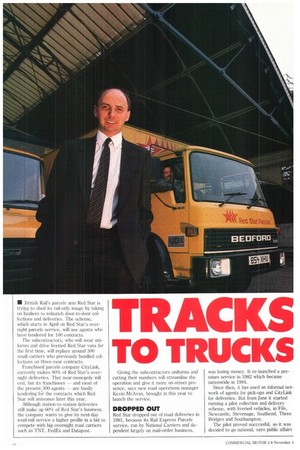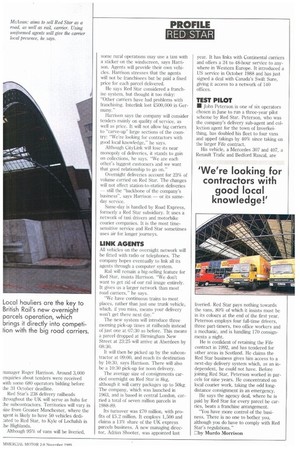TRACKS
Page 44

Page 45

If you've noticed an error in this article please click here to report it so we can fix it.
TO TRUCKS
• British Rail's parcels arm Red Star is trying to shed its rail-only image by taking on hauliers to relaunch door-to-door collections and deliveries. The scheme, which starts in April on Red Star's overnight parcels service, will use agents who have tendered for 100 contracts.
The subcontractors, who will wear uniforms and drive liveried Red Star vans for the first time, will replace around 300 small carriers who previously handled collections on three-year contracts.
Franchised parcels company CityLink, currently makes 90% of Red Star's overnight deliveries. That near-monopoly will end, but its franchisees — and most of the present 300 agents — are busily tendering for the contracts which Red Star will announce later this year.
Although station-to-station deliveries still make up 60% of Red Star's business, the company wants to give its next-day road-rail service a higher profile in a bid to compete with big overnight road carriers such as TNT, FedEx and Datapost. Giving the subcontractors uniforms and cutting their numbers will streamline the operation and give it more on-street presence, says new road operations manager Kevin McAvan, brought in this year to launch the service.
DROPPED OUT
Red Star dropped out of road deliveries in 1981, because its Rail Express Parcels service, run by National Carriers and dependent largely on mail-order business, was losing money. It re-launched a premium service in 1982 which became nationwide in 1984.
Since then, it has used an informal network of agents for pick-ups and CityLink for deliveries. But from June it started running a pilot collection and delivery scheme, with liveried vehicles, in Fife, Newcastle, Stevenage, Southend, Three Bridges and Southampton.
The pilot proved successful, so it was decided to go national, says public affairs manager Roger Harrison. Around 3,000 enquiries about tenders were received with some 680 operators bidding before the 31 October deadline.
Red Star's 238 delivery railheads throughout the UK will serve as hubs for the subcontractors. Territories will vary in size from Greater Manchester, where the 'gent is likely to have 50 vehicles dedimted to Red Star, to Kyle of Lochalsh in he Highlands.
Although 95% of vans will be liveried, some rural operations may use a taxi with a sticker on the windscreen, says Harrison. Agents will provide their own vehicles. Harrison stresses that the agents will not be franchisees but be paid a fixed price for each parcel delivered.
He says Red Star considered a franchise system, but thought it too risky: "Other carriers have had problems with franchising. Interlink lost £500,000 in Germany."
Harrison says the company will consider tenders mainly on quality of service, as well as price. It will not allow big carriers. to "carve-up" large sections of the country: "We're looking for contractors with good local knowledge," he says.
Although CityLink will lose its near monopoly of deliveries, it stands to gain on collections, he says. "We are each other's biggest customers and we want that good relationship to go on."
Overnight deliveries account for 23% of volume carried on Red Star. The changes will not affect station-to-station deliveries — still the "backbone of the company's business", says Harrison — or its sameday service.
Same-day is handled by Road Express, formerly a Red Star subsidiary. It uses a network of taxi drivers and motorbike courier companies. It is the most timesensitive service and Red Star sometimes uses air for longer journeys.
All vehicles on the overnight network will be fitted with radio or telephones. The company hopes eventually to link all its agents through a computer system.
Rail will remain a big-selling feature for Red Star, insists Harrison. "We don't want to get rid of our rail image entirely. It gives us a larger network than most road carriers," he says.
"We have continuous trains to most places, rather than just one trunk vehicle, which, if you miss, means your delivery won't get there next day."
The new system will introduce three morning pick-up times at railheads instead of just one at 07:30 as before. This means a parcel dropped at Rimingham New Street at 23:25 will arrive at Aberdeen by 08:30.
It will then be picked up by the subcontractor at 09:00, and reach its destination by 10:30, says Harrison. There will also be a 10:30 pick-up for noon delivery.
The average size of consignments carried overnight on Red Star is 8kg, although it will carry packages up to 50kg. The company, which was launched in 1963, and is based in central London, carried a total of seven million parcels in 1988-89.
Its turnover was £70 million, with profits of £5,2 million. It employs 1,500 and claims a 13% share of the UK express parcels business. A new managing director, Adrian Shooter, was appointed last year. It has links with Continental carriers and offers a 24 to 48-hour service to anywhere in Western Europe. It introduced a US service in October 1988 and has just signed a deal with Canada's Swift Sure, giving it access to a network of 140 offices.
TEST PILOT
• John Peterson is one of six operators chosen in June to run a three-year pilot scheme by Red Star. Peterson, who was the company's delivery sub-agent and collection agent for the town of Inverkeithing, has doubled his fleet to four vans and upped takings by 40% since taking on the larger Fife contract.
His vehicle, a Mercedes 307 and 407, a Renault Trafic and Bedford Rascal, are


























































































































































